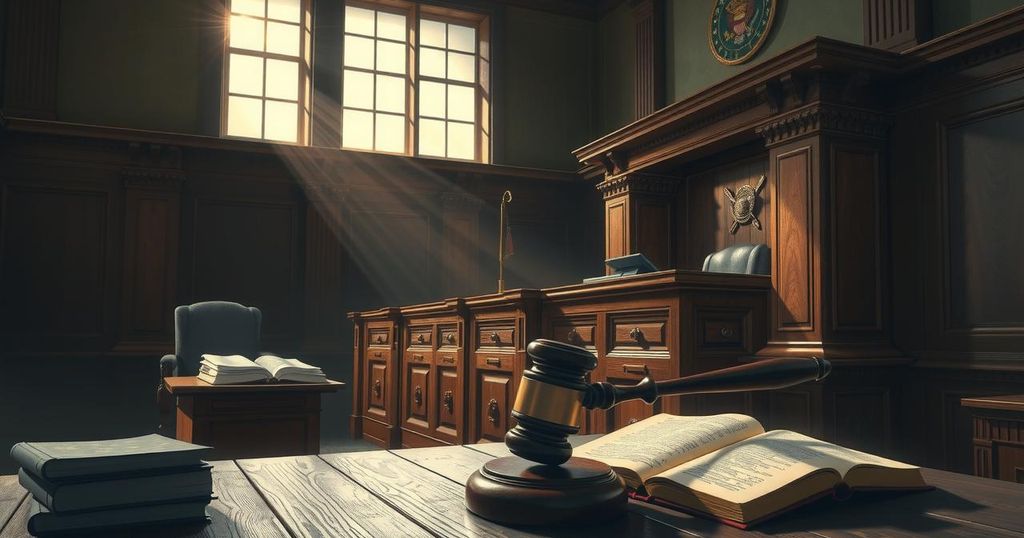Bolsonaro Denies Coup Plot but Admits to Discussing Ways to Stay in Power

Former Brazilian President Jair Bolsonaro denies masterminding a coup plot but admits to discussing alternatives for remaining in power after losing the 2022 elections. His testimony hints at exploring military intervention and suspension of civil liberties. The trial includes high-ranking military officials and highlights the discussions about a coup occurring within his government. Verdict anticipated later this year.
In a dramatic day at the supreme court, former Brazilian President Jair Bolsonaro has firmly denied orchestrating a coup plot. He did, however, acknowledge participating in discussions about “alternative ways” to remain in power following his loss to Luiz Inácio Lula da Silva in the 2022 elections. Over the course of two hours of questioning, the 70-year-old articulated that upon the electoral court’s validation of Lula’s victory, various constitutional options were reviewed.
Among the options discussed were the potential use of military force and the suspension of certain civil liberties. Despite confirming these conversations, Bolsonaro contended that such discussions should not be classified as an attempted coup. “A coup is something abominable… the day after is simply unpredictable and harmful to everyone,” he remarked, insisting that Brazil lacked the conditions for such a scenario during his tenure.
Bolsonaro admitted that his allies had pondered declaring a state of siege, but ultimately decided against it due to the absence of any conducive atmosphere. He asserted that there was no solid foundation to act upon. This admission adds to the mounting evidence against Bolsonaro as former senior military officials have, under police questioning, expressed their opposition to his plans during those discussions.
During the hearing, Bolsonaro, with a noticeably strained voice, shifted much of his questioning into a defense of his administration from 2019 to 2023 while simultaneously criticizing Lula’s ongoing presidency. An intriguing moment arose when he interacted with Justice Alexandre de Moraes, who led the judicial proceedings. Bolsonaro had previously disparaged Moraes, referring to him derogatorily. Nonetheless, he offered an apology for suggesting that Moraes and other justices received millions to manipulate elections, dubbing it a moment of rhetorical venting.
Even barred from future candidacy due to another electoral ruling against him, Bolsonaro playfully suggested inviting Moraes to be his running mate in 2026. Moraes humorously declined the offer, further solidifying the strange, tense atmosphere of the hearings.
Bolsonaro is among eight defendants accused of participating in a plot to overthrow the government, marking unprecedented instances of high-ranking military officials facing trial for coup-related charges in Brazil. This follows a history of dictatorship from 1964 to 1985. Journalist and analyst Miriam Leitão pointed out the peculiar normalcy with which coup discussions occurred within Bolsonaro’s administration, emphasizing the secrecy surrounding meetings in official settings.
The testimony has only just begun, with Bolsonaro’s former aide-de-camp, Lt Col Mauro Cid, taking the stand first after entering into a plea bargain. His testimony, along with evidence presented by federal authorities, serves as a cornerstone of the prosecution. Cid confirmed an edited draft decree attributed to Bolsonaro, which originally called for arrests of key figures and the establishment of a commission to instigate new elections.
Once the testimonies have concluded, both prosecution and defense will be given a five-day window to request additional inquiries for further evidence. Following this, the final arguments will unfold as the case meanders toward a verdict anticipated later in the year.
In summary, Jair Bolsonaro has denied leading a coup plot but has admitted to exploring alternative paths to maintain his presidency after losing the 2022 elections. His defense included discussions of military intervention and state measures, which he claims were not a coup attempt. The trial is historic as it involves high-ranking military officials and scrutinizes the unusual casualness with which coup discussions were held in his administration. The case continues to develop as testimonies and evidence are presented, with a verdict expected later this year.
Original Source: www.theguardian.com







